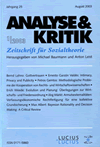Suchergebnisse
"David Miller"
Titel: Are Multinational Companies Responsible for Working Conditions in Their Supply Chains? From Intuition to Argument
Autor: Sonja Dänzer
Seite: 175-194
Abstract: Although many people seem to share the intuition that multinational companies (MNEs) carry a responsibility for the working conditions in their supply chains, the justification offered for this assumption is usually rather unclear. This article explores a promising strategy for grounding the relevant intuition and for rendering its content more precise. It applies the criteria of David Miller's connection theory of remedial responsibility to different forms of supply chain governance as characterized by the Global Value Chains (GVC) framework. The analysis suggests that the criteria for identifying MNEs as remedially responsible for bad working conditions in their direct suppliers are fulfilled in many cases, even though differentiations are required with regard to the different supply chain governance structures. MNEs thus have a duty to make sure currently bad working conditions in their suppliers are changed for the better. Moreover, since production in supply chains for structural reasons continuously generates remedial responsibility of MNEs for bad working conditions in their suppliers, it puts the prospective responsibility on them to make sure that their suppliers offer acceptable working conditions. Further, it is suggested that the remedial responsibility of MNEs might require them to make financial compensation to victims of bad working conditions and in grave cases initiate or support programs to mitigate disastrous effects suffered by them.
Titel: Liberalismus, Nationalismus und das Recht auf Selbstbestimmung
Autor: Frank Dietrich
Seite: 239-258
Abstract: In recent years theorists, such as Yael Tamir and David Miller, have proposed a liberal form of nationalism thereby combining two seemingly incompatible traditions of thought. Perhaps the most controversial element of their theories is the claim that national communities should be accorded with a right to political self-determination. In the article it is explained, firstly, why membership in a nation is seen as important for the individual's well-being and, secondly, why statehood is deemed necessary for the thriving of the nation. Subsequently, two problems of the liberal nationalists' argument for political self-determination are discussed. It is argued, firstly, that national communities only need some form of regional autonomy to achieve their most important goals and, secondly, that non-national communities, e.g. religious groups, can base their demand for political sovereignity on the very same argument.
Titel: Virtues and Practices
Autor: David Miller
Seite: 49-60
Abstract: Maclntyre presents an account of the virtues first in terms of practices and then in terms of the narrative unity of a person's life. He fails, however, to observe an important distinction between self-contained and purposive practices; if the virtues are to be understood by reference to practices, they must be of the latter kind. By the same token, a defence of the virtues must refer to the social purposes which practices serve rather than to the goods internal to practices. An appeal to the idea of narrative unity does not save the position in the absence of any concrete specification of the good life for man. Maclntyre's attempt to reconstitute the virtues falls foul of the moral pluralism that he has earlier diagnosed so acutely.

Work and Cooperation
2011 (33) Heft 1
Editorial
Both in social theories with the aim of looking into the creative core of society as well as in everyday politics, two intuitions often supplement each other. The first intuition, empirico-analytical, views common organization of work and production as being the very aim of society, and other parts of society being explicable from this. A second intuition, ethical or moral, holds the sphere of work to be the central site for diagnoses of a society's inherent justice. Both intuitions not only con...